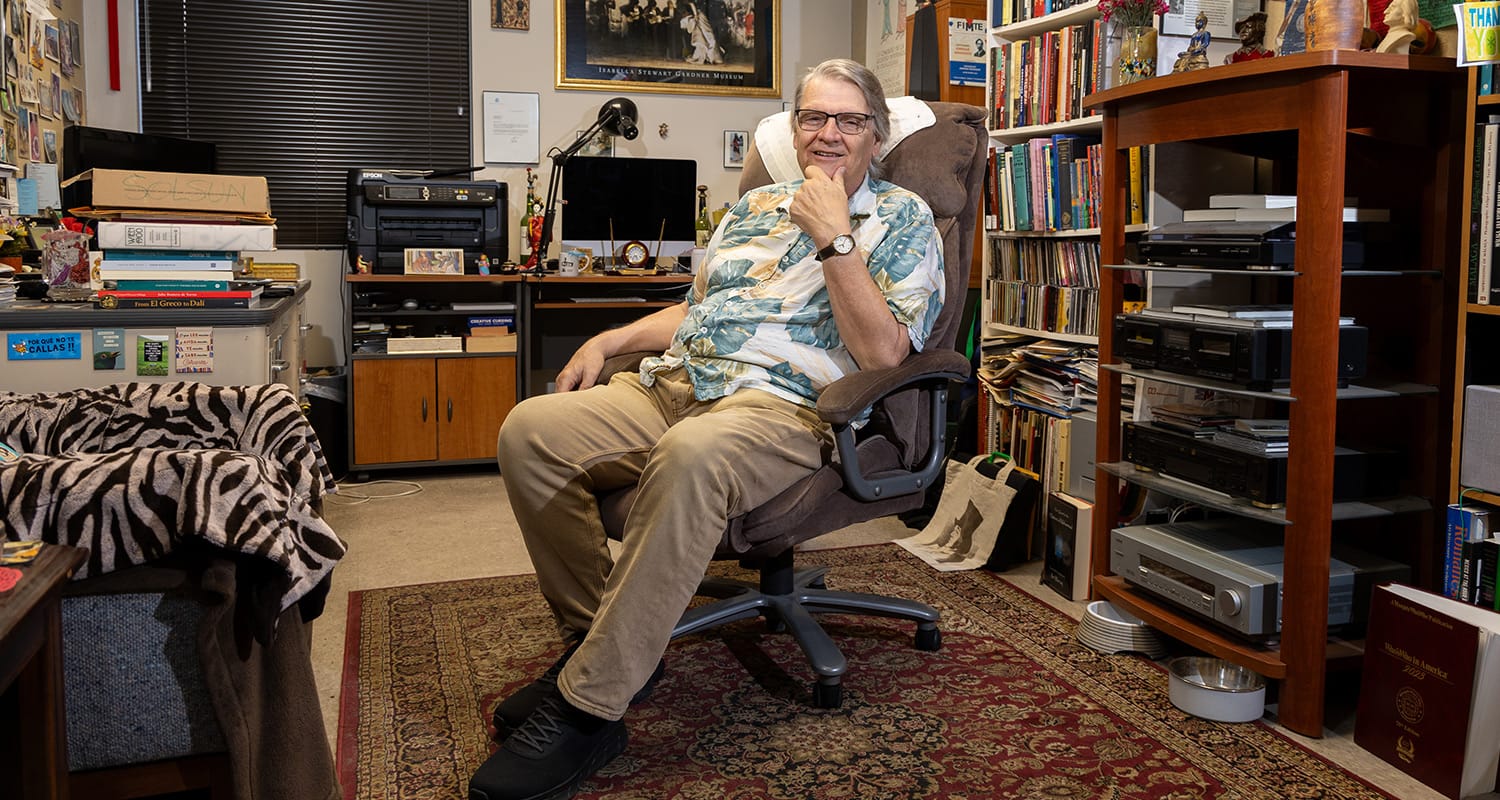OFFICE HOURS
A Spanish Knight’s Tale
Step inside musicology professor Walter Clark’s office to learn how his love of Spanish guitar led to the honor of a lifetime
By J.D. Mathes | Photos by Stan Lim
O n the campus of UCR walks a Spanish knight. He’s not immediately recognizable as a knight, without armor, a trusty steed, or a squire, and you won’t find him tilting at windmills. No, this knight — and he has a Knight’s Cross to prove it — might just be wearing a tropical-print shirt and khakis.
Walter Clark, a distinguished professor of musicology, specializes in the music of Spain and Latin America and serves as director of UCR’s Center for Iberian and Latin American Music. He teaches a variety of undergraduate and graduate courses in music and music history and has advised more than 50 students in doctoral, master’s, and senior honors programs. When he joined UCR in 2003, he had wanted to paint his office to reflect his vibrant personality but was given only two choices: white or gray. He thought, “Fine. I’ll take the gray and put colorful stuff all over the walls to give it some life.”
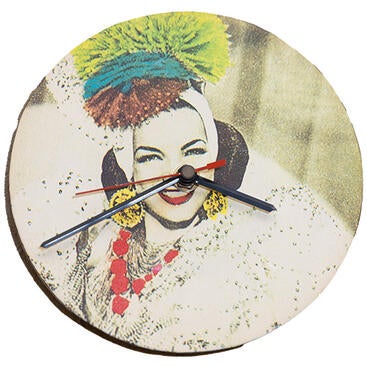
Clark enjoys when visitors come into his office and wonder at the range of memorabilia. What’s up with the guy who’s got a blue Buddha; busts of Franz Liszt, Richard Wagner, and Johannes Brahms; a Carmen Miranda clock; a flamenco shawl; and the Hindu deity Saraswati playing a string instrument next to a figurine of the Virgin Mary?
With all the religious iconography, you’d expect him to be a religious person, but he’s not.
“I am interested in comparative religion: what people believe and why they believe it,” Clark said. “I used to go to lunch with the chair of our religious studies department, the late June O’Connor. I once told her that, ‘I think religion is the most interesting thing that people do.’ She loved the quote and used it on the department’s website.”
Clark says it’s impossible to understand the history of Western classical music without understanding the history of Christianity. He also emphasizes to his students the Buddha’s connection with music, noting Wagner’s opera “Tristan und Isolde” was inspired by Buddhist teachings.
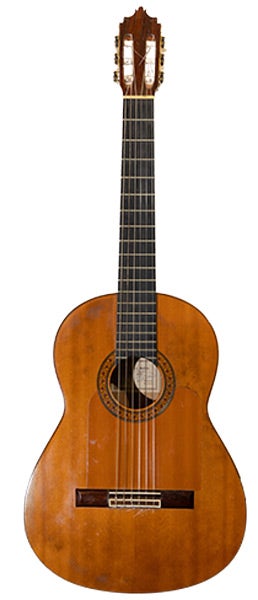
“Here’s a human being sitting still, peacefully contemplating the inner world of consciousness,” Clark said, pointing to the blue Buddha on a shelf. “I think that’s a very special thing for a human being to do.”
One of Clark’s favorite deities is Saraswati, and she is everywhere in his office. The Hindu goddess of music, poetry, and education, she plays an instrument called a veena, which he said “looks like a guitar with a thyroid condition.”
“If somebody pointed a gun at my head and said, ‘You must worship a supernatural being of some kind,’ it would be Saraswati,” Clark said.
Like many 11-year-old boys in 1964, Clark was swept up in the Beatles craze and wanted to play guitar like George Harrison. But when he was 14, he arrived for his lesson as his guitar teacher was playing a Spanish-style classical piece.
“I had a vision of musical truth,” he said. “That’s what I wanted to learn.”
Coincidently, a man had just returned to Clark’s hometown of Minneapolis from Spain, where he’d been studying flamenco. He accepted Clark as a student, and Clark started studying flamenco and classical guitar. Soon thereafter, a Spanish woman in town started a dance company and Clark played guitar for her classes. But he realized that to be a good accompanist, he needed to learn how to dance.
“I wanted to anticipate the dancer’s movements. That led to this here in 1969,” he said, pointing to a photo of himself outfitted in Spanish attire and dancing a sevillanas, a style influenced by flamenco. “The castanets on the wall are the ones I used. They helped to make me a better player and accompanist.”
Clark took a flamenco guitar from a case and played a quick Spanish tune. The guitar had belonged to a friend, and after his passing, his widow entrusted it to Clark, asking him to keep playing it.
“I like to tell my students this was made almost 50 years ago in Granada by the famous maker José López Bellido,” Clark said of the guitar. “I always play this in my classes. It’s perfect for demonstrating basic musical principles.”
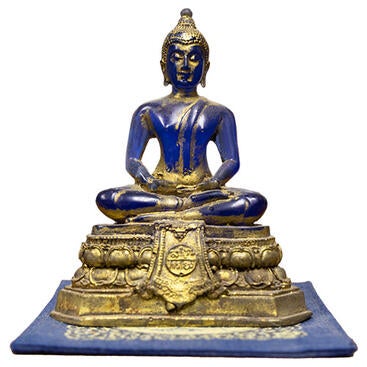
The top row of a bookshelf in Clark’s office contains all the books he has written or edited, including the first-ever biography of the Spanish pianist and composer Isaac Albéniz in English, published by Oxford University Press.
“Then I was off to the races,” he said, indicating a section of the shelf. “I created a series for Oxford devoted to Latin American and Iberian music, and these are all books that have been published in that series.”
Hanging on the wall next to the bookshelf is a small sombrero, a souvenir from Zacatecas, Mexico, a place Clark visited in 2019 and said he’d love to return.
“The famous composer Manuel Ponce was from that region,” he said. “I performed in a master class with Andrés Segovia in 1975, and I chose to play a work by Ponce, one of my favorite composers.”
On the same wall is a clock featuring Carmen Miranda, of whom Clark is a big fan and whose Hollywood musicals he has written about. When a doctoral student of Clark’s went to Brazil to do research for her dissertation, he asked for a souvenir.
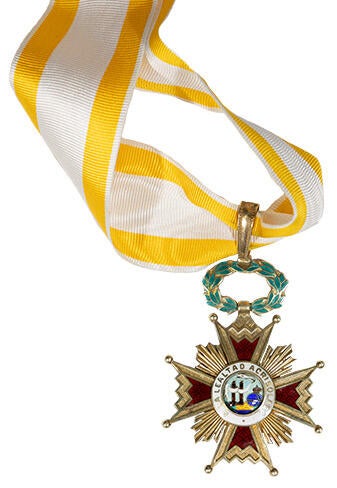
“I asked her to bring me something with Carmen Miranda,” he said. “She returned with that clock.”
The greatest honor of Clark’s life came in 2016, when he got a call from the Consul General of Spain in Los Angeles telling him that King Felipe VI had awarded him the title of “Knight Commander.” At first, Clark told the consul he didn’t deserve such an honor and asked if he could decline. The consul said no.
A ceremony was held at UCR, during which he was presented with the Knight’s Cross and gave a speech. Chancellor Kim A. Wilcox, Dean Milly Peña, family, friends, colleagues, and students were in attendance, and the great flamenco guitarist Pepe Romero played the guitar.
“I have a ritual: Every day that I come into my office, the first thing I do is open this up,” Clark said, putting his hand on the box holding his Knight’s Cross. “I don’t do anything else until I kiss the cross, a holy, sacred thing I love.”
Clark considers the cross the highest honor he could ever receive. If offered a Nobel Prize instead, he said he’d turn it down.
“Almost 60 years ago, I fell in love with Spanish music and culture,” he said. “I’ve been in love ever since.”
Return to UCR Magazine: Fall 2024
